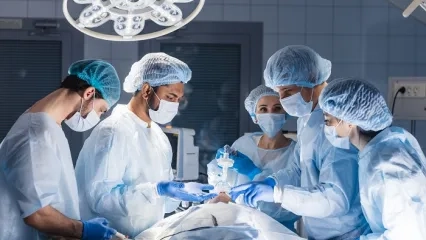Alo Yeditepe
Alo Yeditepe
What is Gallbladder Surgery?
What is Cholecystotomy (Gallblader Surgery)?
Gallbladder surgery is a surgical procedure usually performed to treat gallbladder stones or other diseases. The gallbladder is an organ that stores bile fluid produced by the liver. Gallbladder surgery is a procedure usually performed due to stones in the gallbladder. These stones can cause biliary obstruction or inflammation which can lead to serious health problems.
The most common gallbladder surgery is a minimally invasive surgery called laparoscopic cholecystectomy. This method, which generally involves removing the gallbladder through several small incisions using thin instruments and a camera, is a less invasive approach that provides faster recovery.
However, in some cases, gallbladder surgery may need to be performed by open surgery. Open surgery is a more invasive procedure than laparoscopic cholecystectomy and may require longer recovery time.
Gallbladder surgery is often necessary to treat severe pain from gallstones, gallbladder inflammation or other gallbladder diseases. However, the appropriate treatment method for each patient is determined by the physician.
What are the Types of Cholecystectomy?
Gallbladder surgery is performed in two different ways:
Laparoscopic Cholecystectomy:
This method is a minimally invasive surgical procedure and is generally preferred for gallstones. During laparoscopic cholecystectomy, small incisions are made in the abdomen and the gallbladder is removed through these incisions with the help of thin instruments and a camera (laparoscope). Laparoscopic cholecystectomy is a surgical method that provides significant benefits for patients due to its advantages such as less pain, less blood loss and faster recovery time.
Open Cholecystectomy:
It is a more invasive procedure than the laparoscopic method and is generally preferred in cases where the laparoscopic method cannot be applied or when there are complications. This method is preferred according to the characteristics of the patient, as it may require a longer recovery period and cause more pain.
Which method will be applied is determined by the physician depending on the patient's health condition, the severity of the gallbladder problem and other factors.
In Which Situations Is Cholecystectomy Necessary?
Gallbladder surgery is generally considered necessary for the following conditions.
Gallbladder Stones: Stones in the gallbladder can fall into the main bile duct, blocking the bile ducts and causing serious pain, inflammation or other complications. The stones formed cause the patient to experience severe pain. For this reason, gallbladder stones usually require surgery.
Gallbladder Inflammation (Cholecystitis): Inflammation of the gallbladder is usually caused by gallstones and causes complaints such as severe abdominal pain, fever, nausea and vomiting. These complaints may be triggered especially after fatty meals. In the case of acute cholecystitis, gallbladder surgery is frequently necessary.
Gallbladder Polyps: Polyps may form in the gallbladder. These polyps can sometimes be cancerous or carry the risk of turning into cancer in the future, so gallbladder surgery may be required in some cases.
Gallbladder Cancer: Although rare, gallbladder surgery is often necessary for treatment when gallbladder cancer is diagnosed.
Gallbladder Dysfunctions: Gallbladder dysfunctions describe diseases that prevent the gallbladder from functioning normally. In these cases, gallbladder surgery may be needed.
The necessity of gallbladder surgery is evaluated depending on the patient's symptoms, health status and other factors. Therefore, it should not be forgotten that the treatment plan for each patient is personalized and the treatment plan is determined by the physician.
What are the complications that may be encountered during Cholecystectomy?
There are potential complications that may occur during and after gallbladder surgery. Some complications such as bleeding, infection, bile leakage, and wound non-healing may occur. It is important to take precautions against possible complications and to act quickly in case of possible complications.
To minimize the risk of complications after gallbladder surgery, pre-surgical preparation and careful procedure during surgery are important. However, every surgery has potential risks and it is important to be informed the patient about possible complications.
What to Pay Attention to After Cholecystectomy?
It is important to pay attention to your physicican's recommendations for a healthy post-operative recovery process. Don't hesitate to contact your doctor with any questions or concerns. This way, you can support your recovery process by getting expert advice and intervene when necessary. It is important to pay attention to these recommendations for a healthy recovery process in the postoperative period. In this way, it will be possible to prevent postoperative complications and recover quickly. Be careful to rest in the post-operative period and get enough sleep to provide the energy your body needs. Additionally, regularly doing the exercises recommended by your physicican will also support your recovery process.
This content was prepared by Yeditepe University Hospitals Medical Editorial Board.
”
See Also
- Fall from Height Led to Kidney Failure, Saved by Sister's Donation
- What is a Liver Transplant, How is it Done? and Who is it For?
- Journey of Hope from Georgia to Turkey: 63-Year-Old Father Donates Kidney to Son
- Does Secondhand Smoke Increase the Risk of Breast Cancer?
- Birthday Gift Becomes a Gift of Life: Kidney Donation from Husband of 20 Years
- Can Liver Cancer Be Prevented?
- Common Misconceptions About Kidney Transplantation
- 19 Years Old Davut MİNAZ, Who Lost 45 Kilos in 4 Months, Clung to Life with His Father's Kidney
- What are the Problems Requiring Gallbladder Surgery?
- Gallbladder Surgery is a Necessity, Not a Choice
- What is Organ Donation?
- Colorectal Cancers and Treatment Methods
- Patched Solution for Umbilical Hernia
- What are the Symptoms and Treatment Methods of Cirrhosis?
- Breast Cancer Diagnosis and Treatment Methods
- Swallowable Gastric Balloon
- What Are the Symptoms of Gallbladder Stones? How Is It Treated?
- 3 Major Developments Shaping Treatment in Colon Cancer
- Can Weight Loss Despite Not Dieting Be a Sign of Cancer?
- The Biggest Obstacle to Early Diagnosis of Breast Cancer: LACK OF INFORMATION
- Serious Risk Factor for Colon Cancer: Heredity
- He Came to Turkey to Get Rid of the Colostomy Bag
- Breast Protective Surgery Is Not Recommended in the Treatment of Multifocal Breast Cancer
- Does Breast Cancer Risk Decrease During Pregnancy and Breastfeeding?
- Breast Cancer Incidence Age Is Decreasing Day by Day
- Early Detection Is Cancer's Most Powerful Enemy
- Breast Cancer Has Dethroned Lung Cancer for The First Time! But, Why?
- Emotional Stress May Affect Risk of Recurrence in Breast Cancer
- Although Her Fears Prevented Her from Going to the Hospital, She Managed to Beat Breast Cancer at the Age of 70
- Age of Breast Cancer Prevalence Falls, yet Mortality Declines
- Breast Cancer Screening Applications Decreased by 10% Before the Pandemic
- Facts About Breast Cancer
- Liver Cancer (Tumor) and Treatment
- Gallbladder Stones
- What Is Appendicitis?
- What is a Kidney Transplant?
- Hemorrhoid Treatment
- Questions About Gastroenterology Surgery
- Surgery for Breast Cancer and Breast Aesthetics Can Be Performed Simultaneously
- What are the Types of Obesity Surgeries?
- Questions About Obesity Surgery
- A New Era in Obesity Surgery
- Overweight
- Are Obesity Surgeries Risky?
- New Study Surprised: “Mortality Increased in Breast Cancer Cases Under the Age of 40”
Alo Yeditepe








